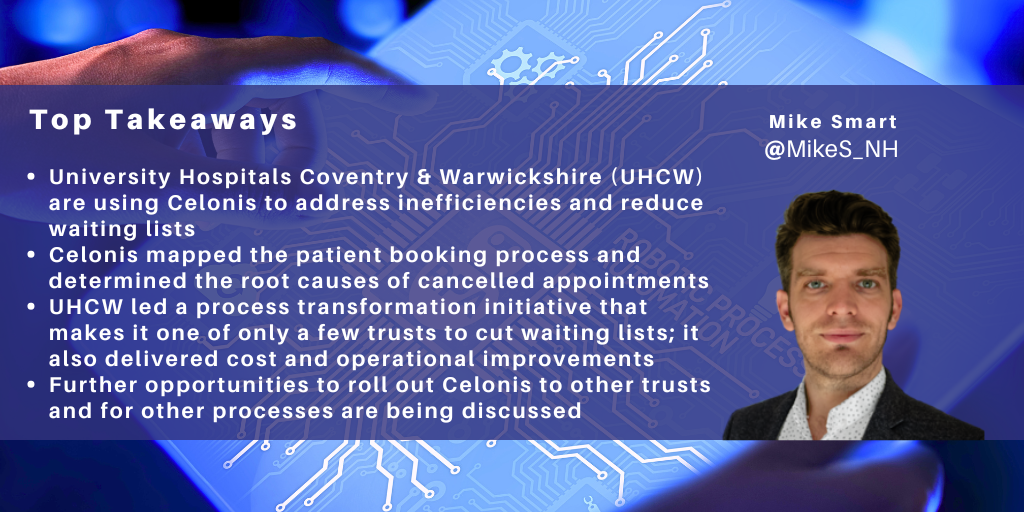posted on Jul 22, 2024 by Mike Smart

In the U.K., the efficiency of the NHS, and particularly the reduction of waiting lists, continues to be a hot political topic. While promises of cash injections are met with skepticism, a recent event in London showcased how data-driven insights could help improve the NHS’ operational efficiency without the need for major financial outlays. As part of its 22-city tour, process mining vendor Celonis presented its vision for transformative applications within the NHS.
How Celonis can deliver NHS efficiencies
The Celonis process mining platform ingests process data from systems of record, for example CRM systems, and supports organizations in visualizing and analyzing process flows to identify opportunities for process efficiency gains.
A standout example at the event was the use of Celonis at University Hospitals Coventry and Warwickshire (UHCW). Collaborating with IBM, UHCW implemented Celonis to address inefficiencies and reduce waiting lists. While the hospital knew the issues it had, Dr Jacob Koris, one of the NHS’ representatives at the event and a fellow of the NHS’ Get It Right First Time initiatives, stated that the insights from Celonis helped uncover the data to guide process transformation programs. Here are some of the insights that were detected and what the trust has done to address specific issues:
Initial challenges
Challenges included:
- 6.3% of patients did not attend pre-booked treatments
- 21% canceled treatments less than five days before the appointment
- 7% of appointments were canceled by the hospital itself
Data-driven solution
Celonis was deployed, integrating patient booking data to help UHCW understand the underlying reasons why treatment appointments were missed or cancelled, as well as suggesting and monitoring process improvement plans.
The Celonis platform mapped out the process, which included patients initially receiving text message reminders the day or even evening before treatment. These late reminders were identified by the Celonis platform as a possible root cause for late cancellations from patients. UHCW conducted A/B testing to send reminders four days before scheduled treatments compared to the initial one day reminder, with Celonis tracking the testing.
This change reduced missed appointments from 10% to 4% and improved proactive communication from patients
Impact
The improved appointment management allowed the hospital to reallocate previously vacant slots to other patients.
UHCW reduced its waiting list from 72,000 to 67,000, one of the few trusts to achieve a waiting list reduction in the past year.
UHCW’s success extends beyond reducing missed appointments. For example:
- Cost savings and efficiency:
- £1.4 million in annual benefits were realized from short-term interventions
- 17,000 appointments were released by reducing wastage
- 700 more patients per week were accommodated without increasing staff numbers
- Operational improvements:
- Addressed low-value clinical time use caused by inappropriate referrals
- Enhanced hospital productivity by reducing high patient call volumes
- Improved patient experience by decreasing waiting times for treatments.
The broader picture
The success at UHCW has led to the adoption of Celonis by other NHS hospitals, including University Hospital Dorset and Dorset County Hospital. These hospitals are also seeing significant benefits. University Hospital Dorset achieved an annualized benefit of £1.8m, while Dorset County Hospital reported an annualized benefit of £1.1m.
IBM is further supporting these hospitals by deploying Watsonx GenAI in PoCs to enhance patient issue coding and automate the validation of clinical letters, reducing the need for human intervention at the hospitals.
Despite these successes, some NHS trusts and hospitals remain cautious due to past experiences with IT projects that promised but failed to deliver significant improvements. However, the tangible benefits realized by UHCW and other hospitals demonstrate the potential of tools like Celonis to not only replicate existing wins but also uncover new efficiencies.
For example, speaking to IBM at the event, the possibility of gainshare or other rewards-based contracting appeared to be a possibility as incentives for other hospitals. Also, at IBM’s recent partner event focused on GenAI, the company demonstrated a number of outcome-based contracts with other clients focused on process transformation using GenAI technologies.
Future use cases discussed by Dr Jacob Koris at the Celonis event include:
- Reducing the need for multiple hospital visits by scheduling all necessary tests on the same day
- Coordinating appointments for patients and their dependents to occur within the same appointment window.
Conclusion
The Celonis event in London highlighted how data-driven process improvements can help the NHS tackle long-standing issues such as waiting lists without the need for significant additional funding. And while the savings made do not go very far in terms of reducing the overall funding gap, the potential impact for more hospitals and more use cases leveraging technologies such as Celonis to help address inefficiencies is clear.

